Fishing enthusiasts enjoy catching tench. This representative of the carp family makes every fisherman pretty nervous, but if you manage to catch a decent specimen, then there is no limit to joy.
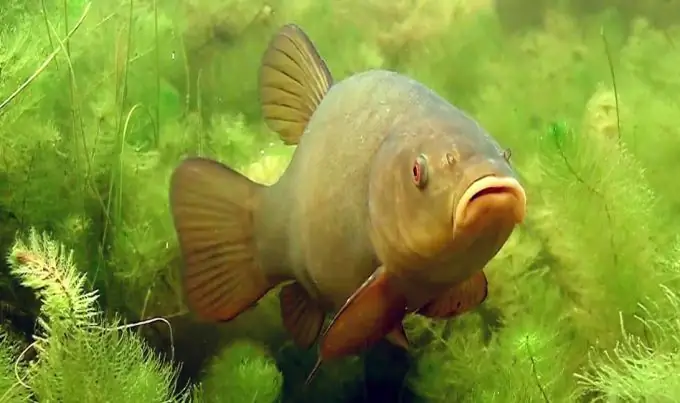
Tench belongs to the carp family. It has a short and thick body with a high "withers". The scales fit tightly to the body and are covered with a thick layer of mucus on top. The color depends on the living conditions. In transparent water with a sandy bottom, the tench is green-silver, and if the bottom is muddy, then the color becomes dark brown with a bronze tint. The tench keeps in quiet creeks, overgrown with soft vegetation, in water places with weak currents. Feels great in lakes, ponds, the shores of which are densely overgrown with reeds and sedge. Lin loves loneliness and a sedentary lifestyle. It keeps closer to the bottom in the bottom thickets, preferring the bright light of darkening.
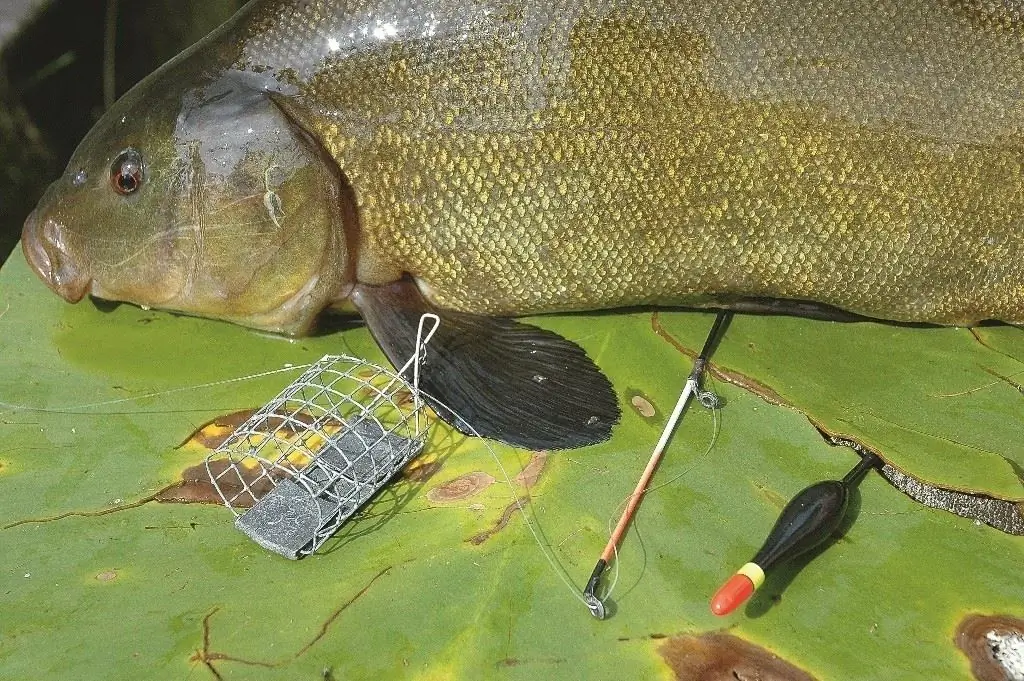
He does not care about the concentration of oxygen in the water, and therefore he lives where many species of fish simply cannot survive. The tench feeds on insect larvae, worms and mollusks that live in silt at a depth of 10 centimeters. Adults of this species also eat plant foods, which can make up up to 60% of the nutritious diet. The tench reaches puberty by 3-4 years. It spawns in June - July, when it becomes maximally warm. The geographical area of its habitat is Europe, where it is a common and most frequent representative of rivers and lakes. It is found in the Yenisei River and its tributaries, in Lake Baikal.
Secrets of catching tench
Lin got its name from its ability to change color in the air, as if to shed. This fish is not exotic and is known to many, even people who are far from fishing. But not every amateur and professional in this business can boast of catching tench. Once on the reservoir where it is found, you need to have special knowledge and skills in catching this type of carp. At first, many people, confusing tench with common crucian carp, use the same fishing techniques and bait with complementary foods. But these two species of carp, although they are representatives of the same family, have a significant difference both in appearance and in lifestyle. Therefore, the fisherman needs to know where the tench swims and what the tench bites on.
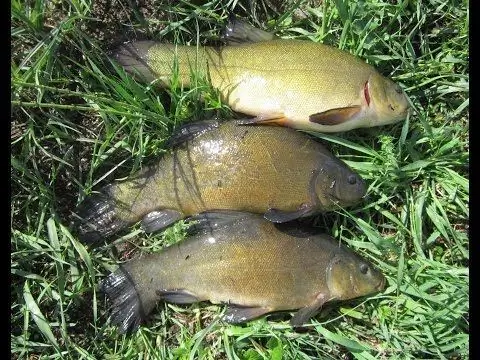
Before you start fishing, you need to carefully inspect the reservoir. Not all places can be chosen by capricious fish. But an area with dense thickets, and especially where aquatic plants such as hornleaf, reed and cattail grow, are best suited for fishing. The tench loves to hide in their bushes. It is known that these plants grow mainly on a muddy bottom, which tench prefers more than a sandy surface.
And here the questions arise: what to fish for in such dense thickets, and where to cast the float rod. This requires a so-called "window" in the thickets of reeds. It is better if this is a growth line, but it is more convenient to cast the fishing device from the boat, as it is much easier to do. Experienced fishermen note that the line of growth of reed plants is a favorite spot for tench. It is there that he is best caught. However, this also has its own difficulties. Often, even with long-term fishermen, line and hook hooks occur when casting. Or the fish itself will pull the tackle into the thickets, from where it will be quite difficult, and sometimes impossible, to pull it out.
Tench fishing season
Mid-May is not the right time to catch tench, as it goes into the thickets, and its bites stop altogether. You need to catch fish after it spawns, or before spawning itself. In summer, tench bites in the morning (it is advisable to start fishing from sunrise to 9 am) and in the evening (before sunset, after 5 pm). In the heat, the fish leaves and hides at the bottom in the cool thickets of the reservoir. Therefore, in order to be able to fish during the daytime in hot weather, it is better to choose in advance a shady and cool place, as much as possible hidden from the sun's rays by leaves creeping along the water surface. It is in such places that the tench hides, and there is hope to lure him out of the depths of the reservoir. The correctly chosen bait is attached to the tackle, and the cast is done under the leaves. If you are lucky, and this place turns out to be a rugged path, then the bite will be immediate.
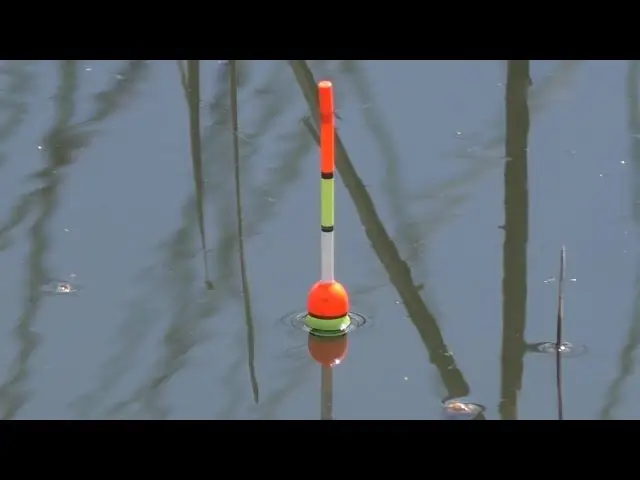
August is the best month for fishing tench. The heat is gone, and the temperature of the water in the reservoir becomes comfortable for the fish. With the arrival of September, tench is caught worse, and in some regions of the country the biting stops altogether, as the water temperature drops sharply.
The art of catching tench with a line
Most fishing enthusiasts catch tench with a regular float rod. Its rigging is absolutely simple. The most common fishing line is needed, with a diameter of 0.2 mm. Two leashes of different lengths are attached to it. Preferably green or brown. This is necessary so that they merge with the bottom and do not scare away cautious fish. The length of the leashes should be different. The first is about 50 cm and the second is 100 cm. Hooks are required with number six in a dark color. These precautions are not in vain, since it is known that fish in a pond are more fearful than tench, there is simply no.
He looks closely for a long time before swallowing the bait, so everything must merge with the bottom and its vegetation. The sinker clings in the form of an olive or a tube 2 cm long. It is better to take a sliding float and made of polystyrene, its green color is welcome, and only the antenna can be bright. If the float is not sliding, but fixed, then this will lead to permanent hooks. Considering all the elements of the fishing rod rigging, it will be possible to enjoy fishing for tench, and not endlessly disentangling the rod from the thickets of reeds.
The right groundbait and tench bait
The traditional “sporty” feeding with balls is absolutely inappropriate for such fishing. Lin is very careful and loves silence, and the "bombing" will only scare him, and the fish will lie on the bottom for a long time. The amount of complementary foods is also important. Its overabundance is more likely to harm than vice versa. Everything should be in moderation. Again, if there is not enough complementary food, and then constant supplementation is needed, then this will only harm the fishing. You need to calculate the amount of complementary foods and do it once. Therefore, carefully going into the water, you need to quietly throw several handfuls of loose bait to the fishing point. The tench is fed an hour and a half before the start of fishing. Ordinary boiled millet serves as a good bait. It does not form turbidity on the water, which, in turn, does not attract small fish. Or a glass of steamed cake is taken, a few handfuls of any large bran and a little black rye bread are added to it. All this is mixed and carefully thrown into the intended fishing point.
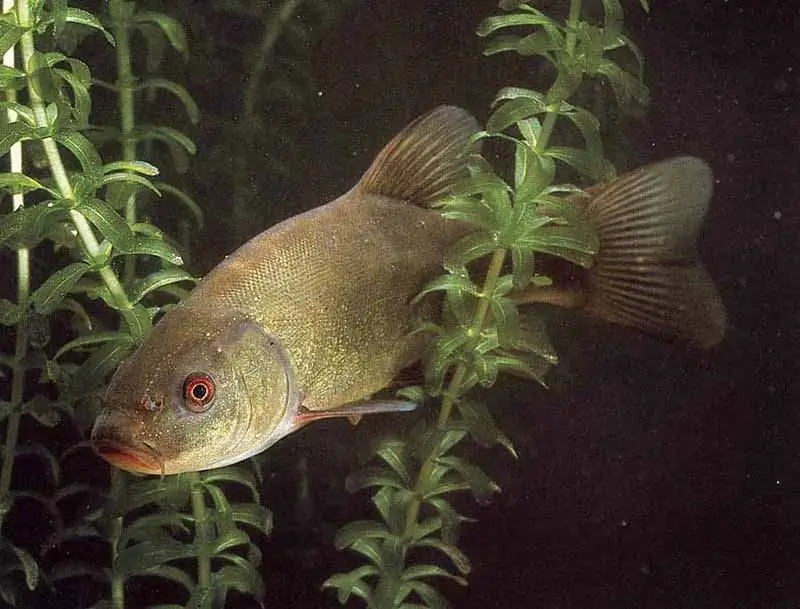
Most tench anglers use a common earthworm bait. Some go further and experiment by soaking the bread with aniseed drops. Maggots are also not uncommon for bait on capricious fish. If you already want to pamper tench, you can offer him shrimp as bait, he bites on them with great pleasure. But the best and most effective thing that the tench bite on is cake. On hooks, since there are two of them, you can simultaneously bait different baits and see in the end which bait the tench prefers. Fishing for this wonderful fish is a real pleasure. Every fisherman dreams of catching his largest and most beautiful carp, and when he succeeds, there is no limit to joy and exultation.






